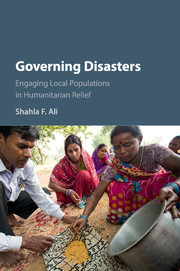Description
Governing Disasters
Engaging Local Populations in Humanitarian Relief
Author: Ali Shahla F.
Drawing on international, state and private sector case studies and a global survey, this book examines local engagement in disaster relief.
Language: English
Subject for Governing Disasters:
Governing Disasters
Publication date: 05-2017
Support: Print on demand
Publication date: 05-2017
Support: Print on demand
Governing Disasters
Publication date: 06-2016
Support: Print on demand
Publication date: 06-2016
Support: Print on demand
Description
/li>Contents
/li>Biography
/li>
With growing awareness of the devastation caused by major natural disasters, alongside integration of governance and technology networks, the parameters of humanitarian aid are becoming more global. At the same time, humanitarian instruments are increasingly recognizing the centrality of local participation. Drawing on six case studies and a survey of sixty-nine members of the relief sector, this book suggests that the key to the efficacy of post-disaster recovery is the primacy given to local actors in the management, direction and design of relief programs. Where local partnership and knowledge generation and application is ongoing, cohesive, meaningful and inclusive, disaster relief efforts are more targeted, cost-effective, efficient and timely. Governing Disasters: Engaging Local Populations in Humanitarian Relief examines the interplay between law, governance and collaborative decision making with international, state, private sector and community actors in order to understand the dynamics of a global decentralized yet coordinated process of post-disaster humanitarian assistance.
Part I. Introduction: 1. New governance and humanitarian aid; 2. Legal background: post-disaster humanitarian aid law and policy; Part II. International-Led Response: 3. Theory and practice of international response; 4. Indonesia's tsunami of 2004; 5. The Haitian earthquake of 2010; Part III. State-Led Response: 6. Theory and practice of state-led response; 7. The Thai flood of 2011; 8. Japan's Tohoku earthquake and tsunami 2011; 9. Hurricane Katrina; Part IV. Examining Public-Private Partnerships: 10. Myanmar's Cyclone Nargis of 2008; 11. Public-private partnerships through crowd-sourced; 12. Governance and humanitarian aid survey data; 13. Conclusions: lessons learned/policy suggestions.
Shahla F. Ali is Associate Professor and Deputy Head of the Department of Law and Deputy Director of the LL.M. in Arbitration and Dispute Resolution at the Faculty of Law at The University of Hong Kong.
© 2024 LAVOISIER S.A.S.
These books may interest you

International Disaster Response Law 105.49 €

International Disaster Response Law 105.49 €

